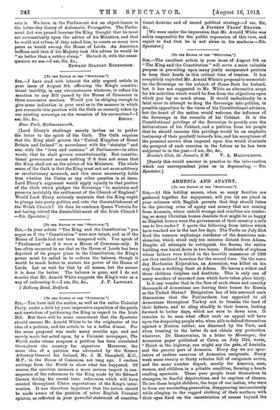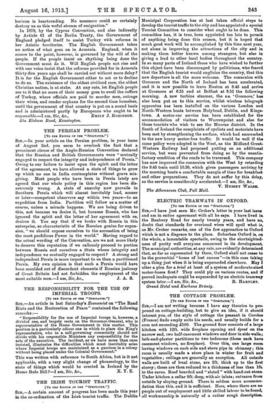ARMENIA AND APATHY.
[To TER Eynon OF TER "SPECTATOR."]
SIR,—At this holiday season, when so many families are gathered together for enjoyment, will you let me plead in your columns with English parents that they should listen to the piercing cries of agony and misery that are coming from Armenia, where untold wrongs and cruelties are render.. ing so many Christian homes desolate that might be as happy as English homes were the government of their country a safe one to live under ? I quote the following from letters which have reached me in the last few days. Tile Turks on July 21st fired the summer orphanage residence of the American mis- sionaries, which stood only ten minutes distant from Adana. Despite all attempts to extinguish the flames, the entire building was burnt down in two hours. Hundreds of orphans whose fathers were killed in the horrible massacres of 1909 are thus rendered homeless for the second time. On the same day Hovhanies Kojavakian, an Armenian, was killed on his way from a wedding feast at Adana. He leaves a widow and three children helpless and destitute. This is only one of many murders of unarmed men which have taken place lately.
Is it any wonder that in the face of such chaos and anarchy thousands of Armenians are leaving their homes for Russia or the United States? Emigration has of late assumed such dimensions that the Patriarchate has appealed to all Armenians throughout Turkey not to forsake the land of their fathers, and to cling steadily to their homes, looking forward to better days, which are sure to dawn soon. It remains to be seen what effect such an appeal will have upon the despairing people who, when able to defend themselves against a Moslem robber, are disarmed by the Turk, and when trusting to the latter do not obtain any protection whatever. Dr. Shmavonian, in a letter to BOussaper, the Armenian paper published at Cairo, on July 15th, wrote, " Haleb is the highway, one might say the gate, of Anatolia and the greater part of Armenia. Every day we are spec- tators of endless caravans of Armenian emigrants. Every week some twenty or thirty vehicles full of emigrants arrive, and the same number depart, mostly for America, men, women, and children in a pitiable condition, forming a heart- rending spectacle. These poor people trust themselves to strangers, to fearful deprivations, and to caprices of chance. To see those bright children, the hope of our nation, who were to form our succeeding generation, disappearing unconsciously while clinging to the ragged clothing of their mothers, with their eyes fixed on the uncertainties of oceans beyond the horizon is heartrending. No massacre could so certainly destroy us as this woful stream of emigration."
In 1878, by the Cyprus Convention, and also indirectly by Article 61 of the Berlin Treaty, the Government of England pledged itself to assist Turkey with reforms in her Asiatic territories. The English Government takes no notice of what goes on in Armenia. England, when it comes to the point, however, is governed by the will of the people. If the people insist on anything being done the Government must do it. Will English people not rise and with one voice insist that the reforms provided for in Armenia thirty-five years ago shall be carried out without more delay P It is for the English Government either to act or to decline to do so. The existence of the oldest civilized race, the oldest Christian nation, is at stake. At any rate, let English people see to it that no more of their money goes to swell the coffers of Turkey, where officials are paid to murder men, outrage their wives, and render orphans for the second time homeless, until the government of that country is put on a sound basis and is administered partly by Europeans who ought to be



































 Previous page
Previous page